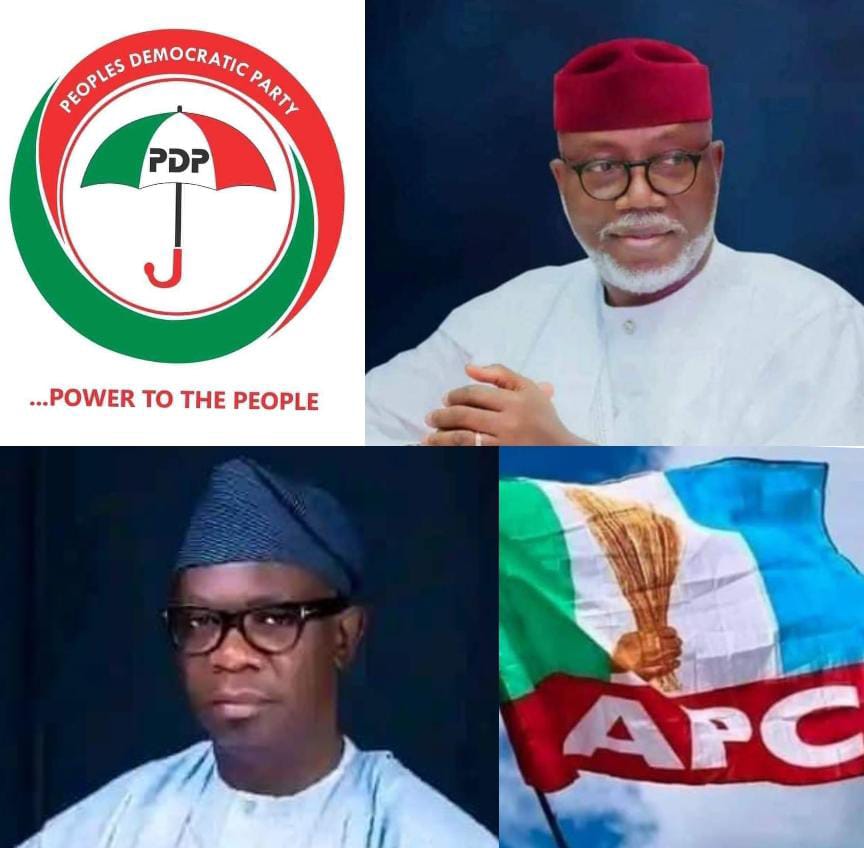
CAN ANY OF THE AGGRIEVED APC OR PDP ASPIRANTS IN THE JUST CONCLUDED GOVERNORSHIP PRIMARIES CONTEST THE ONDO STATE GOVERNORSHIP ELECTION ON THE PLATFORM OF ANOTHER POLITICAL PARTY?
Recent political developments in Ondo State have thrown up heated discuss on whether or not the law allows any of the aspirants aggrieved with the outcomes of the just concluded All Progressives Congress (APC) and Peoples Democratic Party (PDP) governorship primaries to defect to another political party and contest the November 16, 2024 Ondo State Governorship Election.
My candid response to this controversial question, is in the affirmative. However, before I attempt to dissect the law in this regard, based on my own agreeably not-infallible understanding, it is important for me to restate that I do not belong to any political party, and would never join any political party; I have never contested any election, and would never contest any election; I have never accepted any political appointment, and would never accept any political appointment- not even to the most prestigious and coveted position of an Attorney-General.
That is not my calling. Perhaps, the best take off point is the provision of Section 35 of the Electoral Act, 2022, which is source of the legal controversy. The section is titled “Invalidity of Multiple nomination”, and categorically states as follows: “Where a candidate knowingly allows himself to be nominated by more than one political party or in more than one constituency, his nomination shall be void.”
To clearly understand the above provisions of the Electoral Act, it is important to examine the words “aspirant”, “candidate” and “nomination” as consciously used in the Act. Section 84 of the same Electoral Act, 2022 is apposite in this regard. It is titled “Nomination of candidates by parties.” It has 15 sub-sections.
However, only Section 84 Subsections (1), (2) and 5(b(ii) seem to be germane to the analysis of the issue at hand, and they are reproduced below verbatim: “84 (1) A political party seeking to nominate candidates for elections under this Act shall hold primaries for aspirants to all elective positions which shall be monitored by the Commission.”
(2) The procedure for the nomination of candidates by political parties
for the various elective positions shall be by direct, indirect primaries or
consensus.”
(3)……………………………………………………………………………
(4)……………………………………………………………………………
(5) (b)(ii) the aspirant with the highest number of votes cast at the end of
voting shall be declared the winner of the primaries of the party and the
aspirant’s name shall be forwarded to the Commission as the candidate
2of the party, for that particular election.”
From a dispassionate breakdown of the above provisions of the Electoral
Act, 2022, it is clear that:
- Primaries are held by parties to nominate candidates for elective
offices; - The primaries are held for or amongst the party’s aspirants for the
elective offices; - The aspirant with the highest votes is thereafter forwarded to the
Commission (INEC) as the candidate of the parties for the elective
office. Deducing from the foregoing, it is my candid legal view that party
aspirants all go into primaries, but only the aspirant with the highest votes in the primary would become the candidate of the party. In other words, a candidate is the aspirant nominated at the end of the primary.
To clear any iota of doubt about the meanings and usages of these words or terms, Section 152 of the Act proceeds to also define “an aspirant” as “a person who aspires or seeks or strives to contest an election”, while it defines “a candidate” as “a person who has secured the nomination of a political party to contest an election for any elective office.”
From the totality of the foregoing, it is clear that a candidate refers to the
aspirant who has secured the nomination of his party after the party’s primary.
- Consequently, I am of the form view that Section 35 of the Electoral Act,
which states that “Where a candidate knowingly allows himself to be
nominated by more than one political party or in more than one
constituency, his nomination shall be void”, does not and cannot apply to an
aspirant who participated in a primary but did not emerge, or was not
declared, as the party’s candidate.
The Section only prohibits any person from being:
- The candidate of two or more parties for the same elective office
(being the Governorship candidate of both YYY and DDA at the same
time); or - The candidate of one or more party (ies) in two different constituencies (e.g being the Senatorial Candidate in/for both Ondo South and Ondo Central). Consequently, I state that there is no law that prohibits any of the APC or PDP Governorship aspirants in the just concluded Ondo State Governorship
Primary from contesting as the candidate of any other political parties for the November 16, 2024 Governorship Election.
At this juncture, it is imperative to examine the relevant provisions of the law to ascertain if there are other legal hurdles in this regard. The first is the issue of validity of membership of the parties such aggrieved aspirants may want to adopt, bearing in mind the provision of Section 77 (2) & (3) of the Electoral Act, 2022, which mandates parties to maintain a register of their members and submit same to INEC not later than 30 days before the date fixed for the party primaries.
Is any of the aggrieved aspirants likely to have his name in the membership
register of the party he may choose to adopt? It is unlikely, considering INEC
Time Table for the Primaries. But that is of no moment.
Peter Obi defected to the Labour Party less than 30 days before its presidential primary. The APC brilliantly made a big issue out of this at the Presidential Election Petition Court, by arguing that Obi was not even a valid member of Labour Party as at the time he ‘emerged’ its presidential candidate and was therefore not properly sponsored by the Party according to the Constitution and the Electoral Act. In its Judgment, the Presidential Election Petition Court painstakingly reviewed the law and arrived at what has been consistent judicial decisions that the issue of party membership is an internal affair of a party which the court does not dabble into.
On this inviolable principle of the law, I seek to refer to the case recent case of TUMBIDO V. INEC (2023) 15 NWLR (PT 1907) 301 AT PAGE 334
PARAGRAPHS F-G, where the Supreme Court restated that:
“The question of membership of a political party has always been held to be outside the purview of the court’s jurisdiction. It is a matter of which only a political party can decide. To inquire into such matters would amount to court poking into the internal affairs or domestic affairs of a political party and dictating to its members how the affairs of a political party are to be piloted.”
So, the first hurdle actually does not constitute a legal barrier for any
aspirant who could secure the platform of any other party to further his/or her gubernatorial ambition. The second hurdle is how such an aggrieved aspirant could become the candidate of any party that has conducted its own primary and produced a candidate for the Governorship Election.
Under the Law, a party is duty bound to submit the name of any aspirant who
won her primary election to INEC, as her duly nominated candidate. The party can only replace the duly nominated candidate if he dies or withdraws his nomination, based on Section 33 of the Electoral Act.
According to Section 31 of the Act, a candidate may withdraw his nomination by a notice in writing signed by him and delivered personally to the party that nominated him for the election, and the party shall convey such withdrawal to the Commission not later than 90 days before the election.
There is actually nothing new in the provision of Section 35 of the Electoral
Act, 2022 dissected above. It is a verbatim reproduction of Section 37 of the Electoral Act, 2010 (as amended), under which Godwin Obaseki lost the APC Governorship Primary in June 2020 and quickly defected to PDP to contest and won the Governorship Election. The only thing that is new in the Electoral Act, 2022, is that it has now clearly defined and differentiated between an aspirant and a candidate, and therefore leaves no one in doubt that Section 35 thereof does not prohibit an aspirant who was not nominated by a party from contesting the elective office on the platform of another party.
From the above humble analysis of the law, and going by the acrimonies trailing the APC Primaries and the pedigree or antecedents of some of the aggrieved aspirants, it may be too early to predict the list of political titans to expect for the Ondo State November 16, 2024 Gubernatorial Election. After all, as they say, the more, the merrier.
E-Signed: Femi Emmanuel Emodamori (@EmodamoriFemi, A Lawyer, writes from Akure, Ondo State)
(26th April, 2024)










